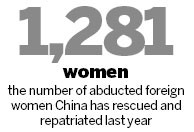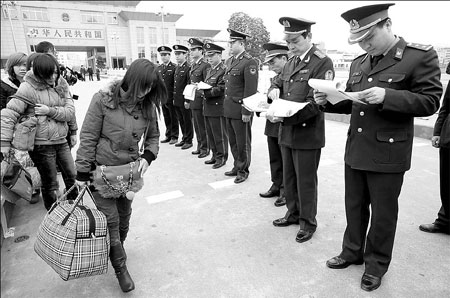Efforts boosted against human trafficking
Updated: 2013-01-22 07:41
By Zhang Yan (China Daily)
|
||||||||
|
Seven Vietnamese women cross the China-Vietnam border to return home early last year. The women had been abducted and taken to Dongxing, the Guangxi Zhuang autonomous region, in 2011. One of them got a chance to make a phone call to Vietnamese police, who coordinated their successful rescue with Chinese counterparts. Tang Huiji / for China Daily |

Particular rise in numbers from South America
China rescued and repatriated 1,281 abducted foreign women last year, along with 84 abducted foreign children, a senior official with the Ministry of Public Security has said.
Most of the victims were from neighboring countries, such as Myanmar, Vietnam, Laos and Thailand, said Chen Shiqu, director of the ministry's human trafficking taskforce.
Recently, police also found some abducted women from South American countries, such as Colombia.
In a typical case, in October, police in Guangzhou, capital of Guangdong province, found four Colombian women working as prostitutes during raids on karaoke bars and other entertainment venues.
The International Organization for Migration's China office had told authorities in August that several South American women had been trafficked to Guangzhou to work in the sex industry.
With help from the Colombian embassy, police eventually arrested five Colombian nationals suspected of people smuggling. The four women were repatriated, according to the Ministry of Public Security.
Criminal gangs operating out of countries such as Colombia have also become a major challenge in the fight against human trafficking in part due to the successful efforts to wipe out the problem in North America, said Dai Peng, a professor of criminal investigation at the People's Public Security University of China.
"The situation got worse last year," Dai said.
"Human trafficking mainly stems from poverty, and the recent unstable political situation in some South American countries has resulted in a flow of people to other countries," Dai said.
He said intensified efforts by the United States and Canada to combat people smuggling had led to gangs looking for new destinations, such as China.
In most cases, the women are tricked into believing there are well-paying jobs waiting for them in China, Chen said, adding that the South American victims rescued so far have held tourist visas.
"Criminal organizations overseas always operate in collusion with a gang in China. They have a strict management structure and assume different tasks, such as kidnapping or transporting victims," Chen said. "Women are abducted from Vietnam and Myanmar and forced into prostitution or illegal marriages in China.
"We must resolutely target the people behind these organizations and make every effort to search for and rescue victims," he said.
However, authorities face major legal and language barriers when it comes to cooperating with counterparts overseas, as well as conducting investigations and collecting evidence abroad.
China has signed the Mekong River Sub-regional Cooperation Anti-trafficking Memo with Thailand, Myanmar, Vietnam and Cambodia, to establish annual high-level exchanges. The ministry has also set up eight border offices with neighboring countries.
In November, the ministry and the International Organization for Migration, which is based in Switzerland, held a seminar in the Chinese capital attended by 60 frontline police officers from 10 provinces and regions.
Chen said discussions included how to identify abduction victims, how to improve coordination between authorities, and shared experiences of rescue work.
"Although some progress has been made, more cooperation in international law enforcement is needed to curb the rampant transnational human trafficking," Chen said.
He vowed that his taskforce will enhance intelligence exchange and cooperate with other countries to discover and rescue victims, and destroy trafficking rings.
The team also arranges regular training with the International Center for Missing and Exploited Children, in the US, and the US central bureau of Interpol.
Chen added that police nationwide will improve rescue work involving cross-border trafficking, streamline deployment and repatriation channels, and explore setting up transiting and rehabilitation centers in border areas for foreign abducted women and children.
Hong Daode, a law professor at the China University of Political Science and Law, urged authorities to continue targeting nightclubs and other entertainment venues considered hotspots for illicit sex services.
Dai at the People's Public Security University of China also said that neighboring countries, as well as those in South America, must strengthen border controls and carefully investigate the identities of people crossing borders to prevent crime at the source.
zhangyan1@chinadaily.com.cn
(China Daily 01/22/2013 page5)

 In Photos: 7.0-magnitude quake hits Sichuan
In Photos: 7.0-magnitude quake hits Sichuan
 Li Na on Time cover, makes influential 100 list
Li Na on Time cover, makes influential 100 list
 FBI releases photos of 2 Boston bombings suspects
FBI releases photos of 2 Boston bombings suspects
 World's wackiest hairstyles
World's wackiest hairstyles
 Sandstorms strike Northwest China
Sandstorms strike Northwest China
 Never-seen photos of Madonna on display
Never-seen photos of Madonna on display
 H7N9 outbreak linked to waterfowl migration
H7N9 outbreak linked to waterfowl migration
 Dozens feared dead in Texas plant blast
Dozens feared dead in Texas plant blast
Most Viewed
Editor's Picks

|

|

|

|

|

|
Today's Top News
Live report: 7.0-magnitude quake hits Sichuan, heavy casualties feared
Boston suspect cornered on boat
Cross-talk artist helps to spread the word
'Green' awareness levels drop in Beijing
Palace Museum spruces up
First couple on Time's list of most influential
H7N9 flu transmission studied
Trading channels 'need to broaden'
US Weekly

|

|








